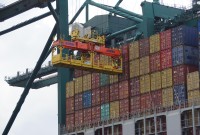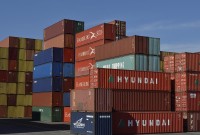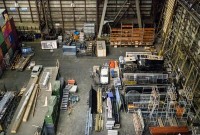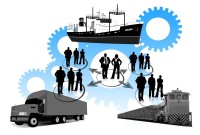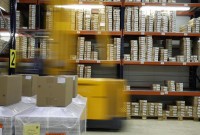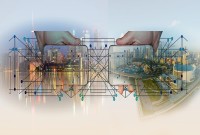- Home
- Business Processes
- Industry Knowledge
- Aerospace Industry
- Automotive Industry
- Banking Domain
- BFSI Industry
- Consumer/ FMCG Industry
- Chemicals Industry
- Engineering & Construction
- Energy Industry
- Education Domain
- Finance Domain
- Hospitality Domain
- Healthcare Industry
- Insurance Domain
- Retail Industry
- Travel and Tourism Domain
- Telecom Industry
- Leadership Skills
- eLearning
- Home
- Business Processes
- Warehouse Management
- Distribution Network Planning
Distribution Network Planning
To stay competitive in today’s tough market, the location of your warehouse is vital. To grow retail business need to offer to customers faster and affordable shipping time, which is dependent on the warehousing location as the location of the warehouse affects the transit time to ship orders to customers.
Distribution network planning determines how many warehouses or distribution centers a company requires to satisfy its customer base, as well as where those warehouses should be located.
Warehousing Location
To stay competitive in today’s tough market, the location of your warehouse is vital. To grow retail business need to offer to customers faster and affordable shipping time, which is dependent on the warehousing location as the location of the warehouse affects the transit time to ship orders to customers. Warehouse location affect the accessibility of business and its products to customers. The site and building need to meet the size, infrastructure, and capacity requirements of your retail business. When choosing your warehouse, also consider the volume of products and seasonal variations.
Some other considerations are:
- The number of products using the warehouse
- The type of demand for each product, how much it varies, average order size, and so on
- Physical features of the products, particularly size and weight
- Special storage conditions, such as climate control, packaging, and so on
- Target customer service level
- Lead times from suppliers and promised to customers
- Economies of scale
- Type of material handling equipment
- Layout of storage and related facilities.
Related Links
You May Also Like
-
Types of Order Picking Methods in the Warehouse
There are many different types of picking in a warehouse and each one works as a customized solution for each business. Depending on the size of your warehouse and inventory, the manpower you have on hand, and the number of customer orders made each day, there may be certain methods that are more efficient for you than others.
-
At a high level, the essential elements in a warehouse are an arrival bay, a storage area, a departure bay, a material handling system and an information management system. As part of the process for enabling a warehouse layout, you must define warehouse zone groups, and zones, location types, and locations.
-
Transport operations are often divided into full load and part load and due to economies of scale, the unit costs are higher for part loads. Our customer needs several part loads delivering, so it can reduce costs by consolidating these into full loads. Then it gets all the part loads delivered to a warehouse near the suppliers, consolidates them into full loads, and pays the lower costs of full-load transport to its operations.
-
One of the most important decisions when running a warehouse is its layout. Warehouse layout defines the physical arrangement of storage racks, loading and unloading areas, equipment and other facility areas in the warehouse. A good layout aligned with the business needs could have a significant effect on the efficiency.
-
One of the warehousing best practices that retailers like Walmart, Amazon, and Target have adopted is known as cross-docking. During this process the inbound products are unloaded at a distribution center and then sorted by destination, and eventually reloaded onto outbound trucks. In real parlance, the goods are not at all warehoused but just moved across the dock (hence the name).
-
Warehouses can be places where piles of packed or loose products occupy space. If left disorganized, it will become very challenging to identify products for packing or picking. Hence, proper organization of warehouse is very important. Warehouse labeling systems eliminate this problem by making sure products are easily identified and managed during the warehousing and shipping process. Labeling is the most functional and cost-effective way to keep your warehouse organized and operating efficiently.
-
Before shipping, businesses need to make sure that the items will arrive in good condition. Packaging is a form of protection against environmental threats that the product will face from the time it leaves warehouse facility until the time it reached the customer. The packaging is intended to provide protection for the item as it is being handled in the warehouse or when the item is being shipped.
-
Types of Inventory Count Processes
While dealing with lots of inventory in a warehouse, lots of things can go wrong. Shipments may not have the right number of units in them, or they could get damaged somewhere along the supply chain. Discrepancies in the stock may arise as part of every inventory control, and need to be corrected immediately after the inventory control procedure has been finished.
-
Warehouses may seem like a simple, straightforward concept, but they actually include a variety of different types of warehouses that all have their own niche. The type of warehousing that’s right for you depends on your specific industry, location, and needs. From private warehousing, distribution centers, and climate-controlled warehouses, there’s an option to suit every business.
-
Resource Planning is the process of planning for expected workload and determining the number of resources required to complete each activity in the warehouse. There are many types of warehouse positions, and they also vary by the employer, the scale of operations and location. Discussed here are generic positions applicable to warehouse management processes.
Explore Our Free Training Articles or
Sign Up to Start With Our eLearning Courses

About Us
Learning
© 2023 TechnoFunc, All Rights Reserved


